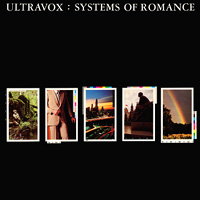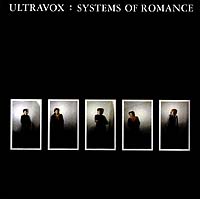
You're sure to know Ultravox, the band without the exclamation mark: Midge Ure, "Vienna", new romanticism, "eighties music" (is that phrase ever welcome?) But Ultravox! is unlikely to be so well known. With the bang, this band was a very different beast. And now their trilogy of albums are to be re-issued. I greet their return from obscurity with this pocket review.
Ultravox! In Review
The debut album Ultravox! (1977) owes a little too much to Bowie and Roxy Music to be taken seriously. Perhaps this was not helped by calling in Brian Eno to produce. Despite the coat-tails, this album paints a dark and hedonistic picture of London in the seventies that updates its antecedents with a taste of a cool new vision to come. John Foxx never could sing and his theatrics are sometimes embarrassing, but he sure could declaim with the best of them. On "My Sex" and "I Want to Be a Machine" his futurist(ic) visions marry perfectly with the sounds of a rock band not afraid to go out on a sonic limb. The next two albums explore the opposite poles defined by this debut with vigour and determination.
Ha! Ha! Ha! (1977) is broken and jagged, full of crazed apocalyptic rock like "Fear in the Western World", which ends with the sound of society tearing itself in twain. This cuts to drifting piano, is one of the most startling and beautiful juxtapositions you will ever hear. "Distant Smile" luxuriates in Enoesque ambience for half its length. But then vocals so out of tune they hurt usher in a guitar riff from some pompous stadium-rock band. Foxx urges on guitarist Stevie Sheers in a moment of complete rockist excess.
It's back and forth from rock to Krautrock all the way through the record. "The Man Who Dies Everyday" sees tip-tap drums emulating a drum machine, while an octave synth pattern forms the template for someone called Gary Numan who would soon burst onto the scene. (With an early song entitled "Everyday I Die", even.) It also defines the jumping off point for post-Foxx Ultravox: cool European robot disco.
Billy Currie cannot go unmentioned. His processed electric violin contributes significantly to the sonic appeal of Ultravox! The howls, wails and sleek glides holds the top end of the spectrum, the place filled by Moog or Prophet sweeps in the less original synth-rock bands that would soon come pouring out of Britain.
I particularly enjoy "Artificial Life", which is the spawn of some mad Diamond Dog. It's a back-water back-street back-beat blues for the year two-thousand. Now that we're in the next century all of this might sound quaint, but the raw energy prevents any such still nostalgic centre from developing. The ferocious fiddle-sawing that climaxes the song leads into a halting, pounding beat and a downward spiral from an ear-piercing oscillator before, suddenly, it's over.
This whirlpool's got such seductive furniture
It's so pleasant getting drowned
So we drink and sink and talk and stalk
With interchangeable enemies and friends
Trying on each other's skins
While we're dying to be born again
-- "Artificial Life"
This album never quite jells into a whole, and that is its power. The arty lyrics are in counterpoint to their raw delivery. Electro and rock work to deny the centre, spinning it out in two directions at once. Cool Teutonic ambience and romantic inner city visions complement each other but do not form a single aesthetic. Ha! Ha! Ha! is all peripheries, never more so than on the ultimate track. "Hiroshima Mon Amour" is less an homage to Resnais than it is a recognition of Bowie and Eno's explorations on the second sides of "Heroes" and "Low". Bubbly drum preset No. 3 is soon joined by languid sax. "Riding intercity trains, wearing European grey" intones Foxx. It seems the new Europeans are here, and unfashionably early too.

And so it's on to the culmination of this group's career, Systems of Romance (1978) 1. The opening track "Slow Motion" makes clear the change in approach from Ha! Ha! Ha!. A slow, considered, harmonically rich and full sound complements a lush arrangement of bass synth, violin and guitar. Part of this is down to the new guitarist, Robin Simon, he of swirling textures. And part is due to replacing rock producer Steve Lillywhite with Euro master Conny Plank.
Even John Foxx is chilled out -- still possessed, but in a different way. Before he was being shaken and cut by demons from the outside, scared by dwellers of dark amphetamine alleys. Now he's under the hypnotic spell of a blue otherworld, unable to shake himself awake. His slow traces through the songs are taken in someone else's clothes, to vague locations, for undefined reasons. He's dislocated, dis-timed. "I'll let the scenery dissolve into some other life," he states, and everywhere he is not himself or any self at all.
But he certainly has a way with syllables, wedded to a delivery that considers each phoneme like a rounded tablet in need of ingestion.
I like to glide in the long green light
of a July afternoon
sliding down a vague conversation
-- "I Can't Stay Long"
There are many wonderful tracks, from the stately "Maximum Acceleration" to "Quiet Men", made in the mold of "The Man Who Dies Everyday" and soon to be mined for everything it was worth on the first post-Foxx album Vienna.
I'm not sure who has the patience for this sort of cool ennui in this day and age. Maybe those who go to the Tate Modern and come out in love with Albers and Moholy-Nagy. But unlike the student following those masters of the plastic arts created, this album stands alone as a direction not taken, a masterpiece which created its own sort of dead end. It disappeared through some dimensional crack into a vine-enshrouded church and never reappeared. 2
Completing the Scene
Pondering the imminent re-issues I will here list the non-album tracks that could be included to form a complete collection.
The debut album was followed by the single "Young Savage", a live version of "Slip Away" on the b-side. That's only two extra tracks for the re-issue of Ultravox! unless we are lucky and see additional songs released from the vaults.
On the other hand there are many possibilities for Ha! Ha! Ha! These start with "Quirks" and "Modern Love" from the single that came with early copies of the vinyl album. There's a different version of "Hiroshima Mon Amour" from the b-side of the "ROckwrok" single and four live tracks from the Retro EP: "The Wild, the Beautiful and the Damned", "My Sex", "The Man Who Dies Every Day", and "Young Savage". Since these are from different gigs I predict a couple will find their way to the first CD to even things up a bit.
This leaves but two tracks for Systems of Romance, the 12" single version of "Quiet Men" and its b-side "Cross Fade", which has already appeared on Japanese versions of the CD and at least one compilation.
There is less chance that the Peel Session from 21 November 1977 ("My Sex", "Artificial Life", "Young Savage) will be included. But that would make the collection complete. 3
1 Typographically the "!" was dropped for this incarnation of the band, though thematically it is still there.
2 Though John Foxx tried with his album The Garden, even drafting in Robin Simon and titling a track "Systems of Romance". Mention must also be made of Urban Verbs, who captured some of the same unsettled sound and in a notable homage titled a track "Acceleration".
3 Thanks to Chris Keep for notifying me of the re-issues.
RELATED POSTS
3 comments:
This is a wonderful appreciation of the achievements of the John Foxx era Ultravox (!). It should be required supplementary reading for anyone whose sense of post-punk is largely dependent on Simon Reynolds' _Rip It Up And Start Again_. While Reynolds has considerable insight into those bands he clearly likes (PiL, Scritti Politti, The Associates), the synth-oriented bands tend to fare less well. Your review rightly notes the band's anomolous place in the musical landscape of the period, stranded somehwere between early Roxy Music and Punk rock, but evolving into a thing of great beauty by the time of Systems of Romance. It is perhaps the articulacy of the band, not only that of Foxx's lyrics, but of their instrumental colourings, that set them apart from much else that was going on at the time (and even more so now).
As an addendum, I would point readers toward the YouTube web site, where one can gain a sense of the band's presence live. There are several clips from 1976 featuring three songs that were never, to the best of my knowledge, recorded. Of greater interest, however, are those from the Ha! Ha! Ha! and Systems of Romance period. The clip of "The Frozen Ones" is mesmerizing, while those from the 1978 Reading Festival show just how difficult it was to reproduce those Conny Plank-produced tracks live--the version of "Quiet Men" is only marginally better than that of Quietus 2!
Here's the link:
http://www.youtube.com/
Chris
Hi Robin,
Just to update your posting on the remastering of the Ultravox(!) albums, here are the additional tracks for each of the titles (courtesy the Metamatic website):
Ultravox!
Slip Away (recorded live at The Rainbow)
Modern Love (recorded live at The Rainbow)
The Wild, the Beautiful and the Damned (recorded live at The Rainbow)
My Sex (recorded live at Huddersfield Polytechnic)
Ha! Ha! Ha!
Young Savage
The Man Who Dies Every Day (remix)
Hiroshima Mon Amour (alternative version)
Quirks
The Man Who Dies Every Day (recorded live at Huddersfield Polytechnic)
Young Savage (recorded live at The Marquee)
Systems of Romance
Cross Fade
Quiet Men (full version)
Foxx himself, btw, has a new album of instrumentals due out in June, which is described as in the vein of "Glimmer, Film One, and Mr. No." It will be called, _Tiny Colour Movies_.
Cheers,
Chris
So, I pretty well had it nailed, except they reserved "Young Savage" for "Ha! Ha! Ha!" and found a remix of "The Man Who Dies Every Day" somewhere. Can't wait!
Post a Comment